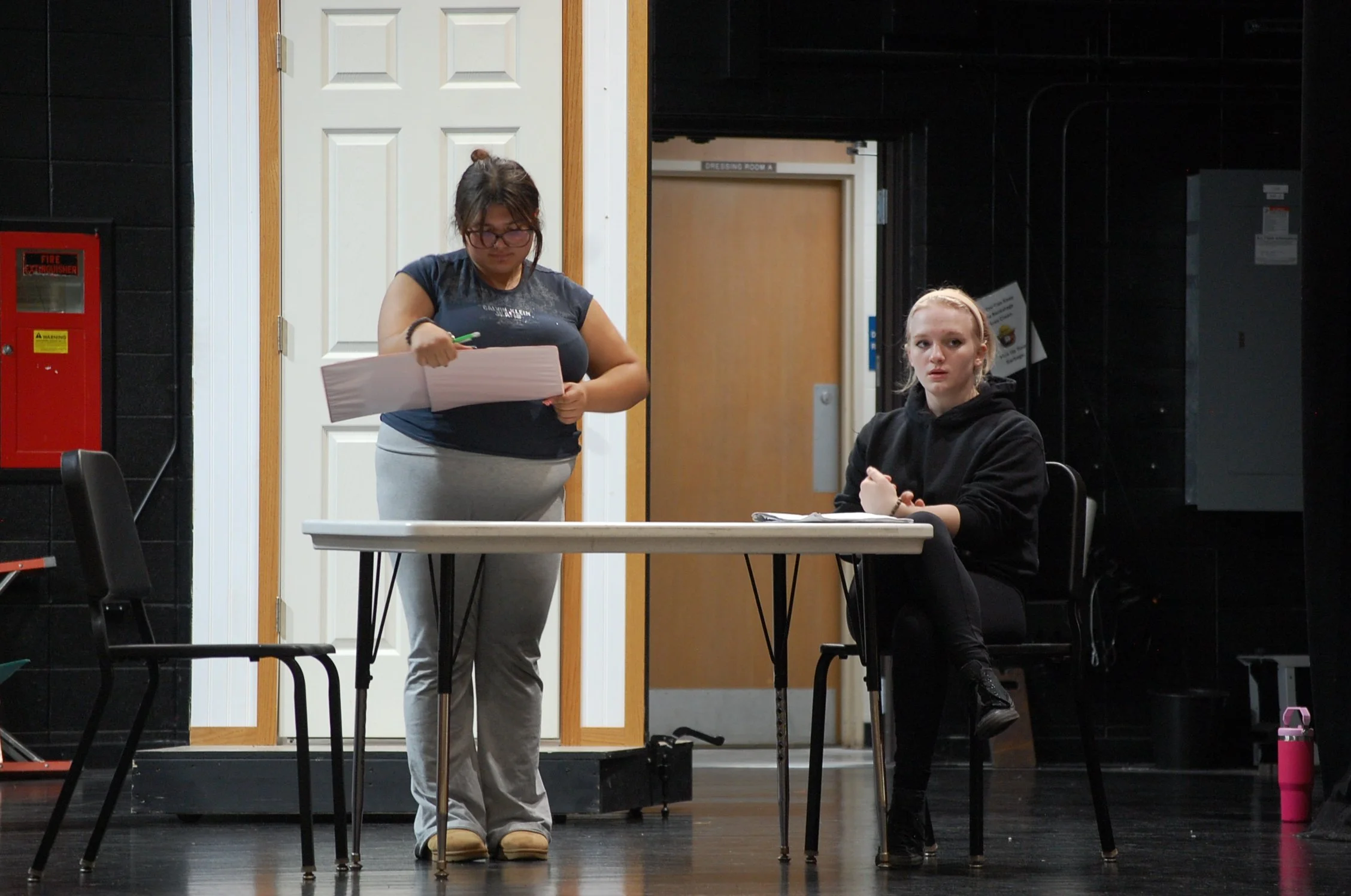Dead? ‘Pearl’ proves the past isn’t even past as One Act hits competition
photo by Novally Thao
Generations of unresolved trauma haunt this year’s One Act play. Set in the year 1912, “Pearl” brings a dose of spooky, Southern Gothic to the performance arena. At its heart is 19-year-old Pearl, who must attempt to unravel the threads of pain stemming from her family’s past before her abusive father forces her to marry a neighboring landowner’s son. Pearl must confront the ghostly remnants of the women who came before her still living in the estate, and uncover the truth before history repeats itself.
The students will perform this play not only for the general public, but at competitions as well. The first competitive performance is at Districts on October 25. This is the initial step in the competition process, as the cast and crew hope to advance to state. The public performance will be on November 14, along with the Variety Show, which is a chance for all students to perform and show off their talents.
When choosing the play, directors and West science and English educators Logan Martilla and Lexi Novak based their decision on last year's One Act and spring play.
“We wanted a bit more drama, and we wanted it to be easily digestible as well,” Martilla said. “This play is ultimately a serious play, but it’s very easy to connect with.”
When this play was selected, Martilla also made sure to consider the play’s impactful themes, which are still relevant in today’s world.
“We still have this sexism that’s rampant everywhere, and seeing that it was a lot worse before, but it’s still around. This means that there’s some sort of call to action to do something about it,” he said.
Novak also appreciates the power of the themes within the play. Despite the fact that the characters lived a century ago, it still resonates.
“It plays on certain things that everyone can relate to, whether that’s generational trauma or having to escape something that you can't escape,” she said. “I think there’s a special connection to any woman trying to fight for their right to be themselves.”
Cast members like sophomore Oliver Van Thiel find the messages to be inspirational and very relevant in today’s world.
“It’s very empowering, and it speaks a lot to me because it gives a voice to women and the trauma they face,” he said.
Junior Kiki Sikes appreciates the complexity that the Dead Women add to the message of the play.
“I think the most interesting part is all of the dead women are those who died because of domestic abuse and violence,” she said. “I think that's very crucial for the play.”
Senior Wilson Clark, who plays Pearl’s father, sees his character as a larger symbol.
“I think that Father is a general representation of the problems from the 1910s that a lot of women faced, and even today,” he said. “He doesn't really have any love; he just wants power.”
Beyond just the messages, the characters themselves have very realistic personalities. Junior Genna Williams finds that she can relate to her role.
“I play Rosemary, and I feel that she reminds me of some of my family members because of her personality and me knowing what they’ve been through,” she said. “She showcases what it means to be silent despite everything, and she’s part of the side that can't say anything despite wanting to.”
The ending in particular holds a certain element of realism. Williams sees the meaning held in the ending of the play.
“The ending has the realization that you can be your own person despite what your generation and family has taught you,” she said.
Junior Grace Schellinger shares a similar opinion; she loves how the ending grows the audience’s understanding of the complex characters.
“The last scene shows everyone’s true colors and characters and shows what they feel inside their heads.” she said.
Even outside of the main cast, many are proud of the work they’ve done so far. Crew members work behind the scenes, helping with costumes, props, lights, and more.
Junior Farhana Amin loves seeing the actors develop their skills.
“My favorite part of the crew is watching it all come together,” she said. “Watching that moment and seeing them get to that point where they can actually be their character is very rewarding.”
Many cast members find a special appreciation in the details of the script coming to life through the hard work of the actors.
“The ensemble does a good job of making the scenes a bigger moment, taking them out of the time frame,” Schellinger said.
The unseen characters are the most vital to the heart of the play. Senior Sam Rayburn feels that the ghosts hold a major significance.
“I love how the ghosts are only visible to certain characters in the scene and yet hold such an important part in the play” they said. “They're telling their own story and that’s one of the main parts that makes it such a good historical drama.”
The cast of Pearl is full of talent across all grade levels and skill sets, according to Martilla.
“This was probably one of the hardest casting decisions ever,” he said.
Schellinger loves the way that everyone works together to make the show what it is. She finds the community to be crucial to putting together a play.
“Without the leads, without the side-roles, without the ensemble and the crew, without everyone being involved,” she said, “the show would not be the show.”
by Millie Kasubaski
Published October 6, 2025
Oshkosh West Index Volume 122 Issue I
